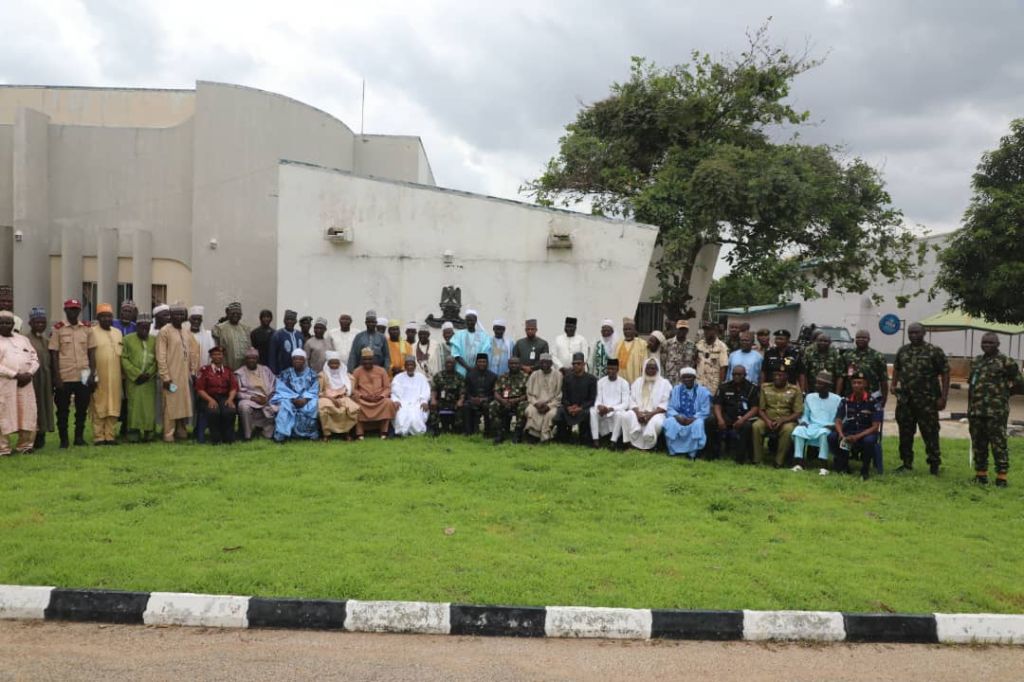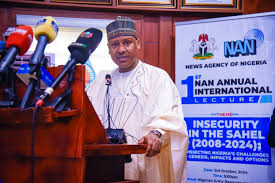A News Analysis By Sumaila Ogbaje, News Agency of Nigeria (NAN)
It was in Oct. 3 that the News Agency of Nigeria (NAN) held its inaugural International Lecture intended to serve as wakeup call on stakeholders in security sector on the need to be more proactive in the fight against insecurity in the country.
The topic of the lecture — “Insecurity in the Sahel (2008-2024): Dissecting Nigeria’s Challenges — Genesis, Impacts and Options’’– was somewhat probing and foretelling, so much so that barely two months after the lecture, a terrorist group known as Lakurawa was identified by the military in the country.
The lecture observed that insecurity in the Sahel marked a significant step towards fostering deeper understanding of the region’s complex security challenges and how it could affect Nigeria.
NAN Managing Director Ali M. Ali believes it is about time the agency charts a course on pathways to peace and economic prosperity in Africa through such well thought lectures.
“Security is the basic; without security, a nation cannot make progress, there will be no economic and social development.
“We’ve seen it in the Northwest where bandits take front row seats, conducting their nefarious activity with impunity, without any fear of reprisals,’’ he said.
He said the lecture would to interrogate the root causes of the violence troubling the Sahel and ignite international conversations around flashpoints in the Sahel.
“We are not looking at insecurity from a local or national level; we’re taking it on a wider paradigm, a bigger scale.
“So, we also think there is a nexus between what’s happening in the Sahel and here, just like we believe that there is a nexus between corruption and insecurity,’’ he said.
Concerned citizens have, therefore, noted that the Sahel region and northern part of the country have witnessed a surge in terrorist activities with new groups emerging while existing ones struggle to expand their reach and networks.
They further observe that the region has been infested by the presence of Al-Qaeda, Islamic State in the Greater Sahara, Jama’at Nusrat al-Islam wal-Muslimin and Islamic State West Africa Province.
Undoubtedly, the emergence of a new terror group — Lakurawa — as confirmed by the Defence Headquarters, has lent credence to the NAN’s inaugural annual lecture on the need to urgently address the menace of insecurity in the Sahel region.
The lecture was conceived by NAN to contribute to the on-going discourse on regional security and as part of its efforts to interrogate the root causes of insecurity in the Sahel and explore potential solutions by bringing together experts and stakeholders.
The key takeaways from the lecture include but not limited to multi-dimensional approach to tackling insecurity.
The lecture emphasised the need to understand the underlying causes of insecurity in the Sahel and steps to strengthening regional security by international cooperation and dialogue.
Confirming the foresight of NAN in news reporting and providing solutions to the envisaged challenges, the Director of Defence Media Operations, Maj.-Gen Edward Buba, at a recent media briefing confirmed that the new terror group –Lakurawa– emerged from the Republic of Niger and Mali axis after the coup that led to the breakdown of military cooperation between Nigeria and the Republic of Niger.
He said that the terrorists began incursion into northern parts of Sokoto State and Kebbi from the Republic of Niger.
He observed that prior to the coup; there were joint border operations with Nigerien security forces which kept the terrorist at bay.
“The terrorists took advantage of the gaps in cooperation between both countries and exploited difficult terrains to make incursions in remote areas in some north western states of the country to spread their ideology,’’ he said.
Buba said that the group was accommodated by the locals who initially thought that the group meant well for them, adding that they failed to report the movement to the military and security agencies.
He gave assurance that troops had sustained Intelligence, Surveillance and Reconnaissance (ISR) to degrade the terrorists, noting that the terror group had continued to take advantage of the vast under-governed areas to hide and evade troops as well as harass the locals.
Similarly, many accounts have emerged as to how the group managed to have footings in Sokoto State and Kebbi.
But some concerned Africans believe that Lakurawa group emerged around 2020, allegedly as a breakaway faction of the Ansaru terrorist group.
The group’s leader is believed to be one Auta, also known as Auta Lakurawa, whose ideology adheres to religious extremism similar to Boko Haram and Ansaru.
Observers note that their objective is to establish a religious state in the northern part of the country, impose Sharia law and fight against perceived western influence and secularism, focusing attacks on security forces and government facilities, kidnappings for ransom, cattle rustling and raids on villages and towns.
Other accounts of their emergence notes that the group existed in Gongono Forest in Tangaza Local Government Area of Sokoto as far back as 2018 on the invitation of herdsmen in the area.
Reports also have it that security operatives, at a time, chased the terrorists out after killing their members and setting the entire forest ablaze.
An intelligence source revealed that the Lakurawa — herders turned militant group– in response to the Malian crisis, appeared along the Nigeria-Niger border in Sokoto’s Gudu and Tangaza regions, not just for cattle grazing but with arms.
It was revealed that no fewer than 200 fighters came to the country from the Republic of Niger in 2018, identified by locals as Arabic and Fulfulde-speaking herders from Mali.
The source said that the district heads of Gudu and Tangaza collaborated with the head of a local cattle breeders’ association to hire the Lakurawa group to fight local bandits.
“While initially successful in driving out bandits, the group soon began enforcing its own rules and collecting forced taxes (zakat), straining relations with locals.
“The first victim of the group when they first arrived in the area was a traditional ruler, the District head of Balle, the headquarters of Gudu Local Government Area, Magajin Garin Balle, who was beheaded by the group after a misunderstanding between the sect and his son.
“The group later had its first encounter with security agents in the densely populated forest in Gongono, where many extremists were killed after which the group’s flag was recovered.
“After the encounter with security agents, the Miyetti Allah Cattle Breeders Association issued a statement to say that the group members were not terrorists as claimed but herdsmen from Mali.
“This was in spite of evidence that they had seized many communities in two local government areas of the state and forcing them to pay taxes,’’ the source said.
Irrespective of this explanation, Dr Mohamed Ibn Chambas, the African Union Chief Mediator in Sudan and speaker in the international annual lecture organised by NAN, enumerated factors fueling insecurity in the Sahel region to include weak governance and corruption.
According to him, weak governance and corruption have helped in creating opportunities for insecurity.
“Sahel region — Libya, Sudan and Mali, among other nations in the region –is so vast that there are lots of ungoverned spaces in the zone, causing an increase in the insecurity rate,’’ he noted.
The incursion of Lukarawa group into the country has made Sen. Waziri Tambuwal, the immediate past governor of Sokoto State, to believe that the present incursion “would not be the first time that the group is coming into the country’’.
Tambuwal recalled that when he was the governor of the state, the group invaded Sokoto State in 2018, but was dislodged.
“We need to nip this in the bud. It is too serious for us to take it lightly because these people are armed with sophisticated weapons. I believe they even have some international connections,’’ he noted.
The Senate, therefore, considered and adopted a motion sponsored by Sen. Yahaya Abdullahi (Kebbi North) to the effect that the Federal Government must take stringent measures to stop the infiltration of a group of violent terrorists known as Lukarawa from entrenching themselves in some northwestern parts of Sokoto State and Kebbi.
In his lead debate, Abdullahi recalled that the group raided and displaced some communities, before it invaded Mera in Augie Local Government of Kebbi State on November 8, killing no fewer than 20 people.
He, therefore, called on the Federal Government to take the matter seriously to protect the citizens from insecurity.
All in all, the Acting Chief of Army Staff, Lt.-Gen. Olufemi Oluyede has ordered that troops to step up action against the group immediately to flush it out.(NAN)
Edited by Kayode Olaitan








